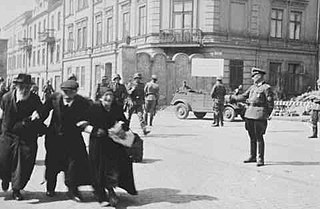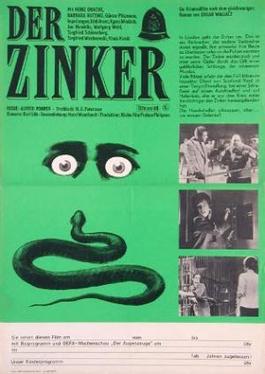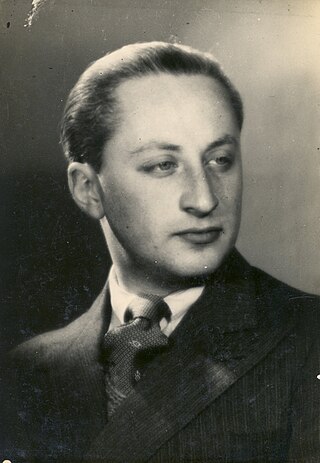
Klaus Kinski was a German actor, equally renowned for his intense performance style and notorious for his volatile personality. He appeared in over 130 film roles in a career that spanned 40 years, from 1948 to 1988. He played leading parts in five films directed by Werner Herzog, who later chronicled their tumultuous relationship in the documentary My Best Fiend (1999).

Bruno Schulz was a Polish Jewish writer, fine artist, literary critic and art teacher. He is regarded as one of the great Polish-language prose stylists of the 20th century. In 1938, he was awarded the Polish Academy of Literature's prestigious Golden Laurel award. Several of Schulz's works were lost in the Holocaust, including short stories from the early 1940s and his final, unfinished novel The Messiah. Schulz was shot and killed by a Gestapo officer, in 1942 while walking back home toward Drohobycz Ghetto with a loaf of bread.

This is a selected bibliography and other resources for The Holocaust, including prominent primary sources, historical studies, notable survivor accounts and autobiographies, as well as other documentation and further hypotheses.
Edgar Wallace (1875–1932) was a British novelist and playwright and screenwriter whose works have been adapted for the screen on many occasions.

Operation Reinhard in Kraków, often referred to by its original codename in German as Aktion Krakau, was a major 1942 German Nazi operation against the Jews of Kraków, Poland. It was headed by SS and Police Leader Julian Scherner from the Waffen-SS. The roundup was part of the countrywide Aktion Reinhard, the mass murder of Polish Jews in the so-called General Government under the command of SS und Polizeiführer Odilo Globočnik.

Artur "Atze" Brauner was a German film producer and entrepreneur of Polish origin. He produced more than 300 films from 1946.

Gideon Greif is an Israeli historian who specializes in the history of the Holocaust, especially the history of the Auschwitz concentration camp and particularly the Sonderkommando in Auschwitz. He served as a visiting lecturer for Jewish and Israeli History at the Schusterman Center for Jewish Studies at the University of Texas at Austin during the academic year 2011–2012. He headed a commission that issued a controversial report in July 2021 that denied that the killing of Bosnian Muslims at and around Srebrenica in July 1995 constituted genocide.
The anti-Jewish violence in Central and Eastern Europe following the retreat of Nazi German occupational forces and the arrival of the Soviet Red Army – during the latter stages of World War II – was linked in part to postwar anarchy and economic chaos exacerbated by the Stalinist policies imposed across the territories of expanded Soviet republics and new satellite countries. The anti-semitic attacks had become frequent in Soviet towns ravaged by war; at the marketplaces, in depleted stores, in schools, and even at state enterprises. Protest letters were sent to Moscow from numerous Russian, Ukrainian and Belarusian towns by the Jewish Anti-Fascist Committee involved in documenting the Holocaust.

The Squeaker is a 1963 West German-French crime film directed by Alfred Vohrer and starring Heinz Drache. It was part of a very successful series of German films based on the writings of Edgar Wallace and adapted from the 1927 novel of the same name.

Jakob Jonilowicz Hebrew: יעקב יונילוביץ (1908–1975) was an Israeli cinematographer.

Moshe Bejski was a Polish-born Israeli Supreme Court Justice and President of Yad Vashem's Righteous Among the Nations Commission. After surviving the Holocaust with the help of Oskar Schindler, Bejski immigrated to Israel. In 1961, he testified about his experiences during the Holocaust during the trial of Adolf Eichmann. He served on the Tel Aviv-Yafo district court from 1968 to 1979 and was appointed to the Supreme Court of Israel, where he served from 1979 to 1991. As President of the Righteous Commission from 1975 to 1991, Bejski helped honor thousands of Holocaust rescuers. He also headed the Bejski Commission in the aftermath of the 1983 Israel bank stock crisis, which led to the nationalization of most of Israel's major banks.
Holocaust studies, or sometimes Holocaust research, is a scholarly discipline that encompasses the historical research and study of the Holocaust. Institutions dedicated to Holocaust research investigate the multidisciplinary and interdisciplinary aspects of Holocaust methodology, demography, sociology, and psychology. It also covers the study of Nazi Germany, World War II, Jewish history, religion, Christian-Jewish relations, Holocaust theology, ethics, social responsibility, and genocide on a global scale. Exploring trauma, memories, and testimonies of the experiences of Holocaust survivors, human rights, international relations, Jewish life, Judaism, and Jewish identity in the post-Holocaust world are also covered in this type of research.
The Plot to Assassinate Hitler is a 1955 West German feature film produced by CCC Film on the failed 20 July 1944 attempt to kill Adolf Hitler. Falk Harnack directed and co-wrote the film's script with Günther Weisenborn. Wolfgang Preiss won the German Federal Film Award for his role as the rebel army officer, Claus von Stauffenberg. The film has a realism that comes close to the style of a documentary.

Artur Eisenbach was a Polish-Jewish historian; an expert on the history of Jews in Poland, member of Polish Academy of Sciences and the head of the Jewish Historical Institute in Warsaw between 1966 and 1968.

CCC Film is a German film production company founded in 1946 by Artur Brauner. A Polish Jew who survived the Nazi era by fleeing to the Soviet Union, he lost dozens of relatives to the Nazis. His primary interest was making films about the Nazi era, but after his first such film failed at the box office, throwing him into debt, he began producing entertainment films, the commercial success of which then financed his Holocaust-related films, some of which also became successful. In 2009, Brauner donated 21 Holocaust-related films to Yad Vashem.
Winnie Markus (1921–2002) was a Czechoslovakia-born German film and television actress.

Rokhl Auerbakh was an Israeli writer, essayist, historian, Holocaust scholar, and Holocaust survivor. She wrote prolifically in both Polish and Yiddish, focusing on prewar Jewish cultural life and postwar Holocaust documentation and witness testimonies. She was one of the three surviving members of the covert Oyneg Shabes group led by Emanuel Ringelblum that chronicled daily life in the Warsaw Ghetto, and she initiated the excavation of the group's buried manuscripts after the war. In Israel, she directed the Department for the Collection of Witness Testimony at Yad Vashem from 1954 to 1968.
Our Children is a 1946 semi-documentary Yiddish-language film created in Polish People's Republic. It was directed by Natan Gross and Saul Goskind based on the script by Rachel Auerbach and Binem Heller. Its frame story is the interaction of Jewish orphans who survived the Holocaust with popular Polish comic duo Dzigan and Shumacher After the premiere the film was banned in Poland. In 1951 an English-language dubbing was released under the title It Will Never Happen Again,












